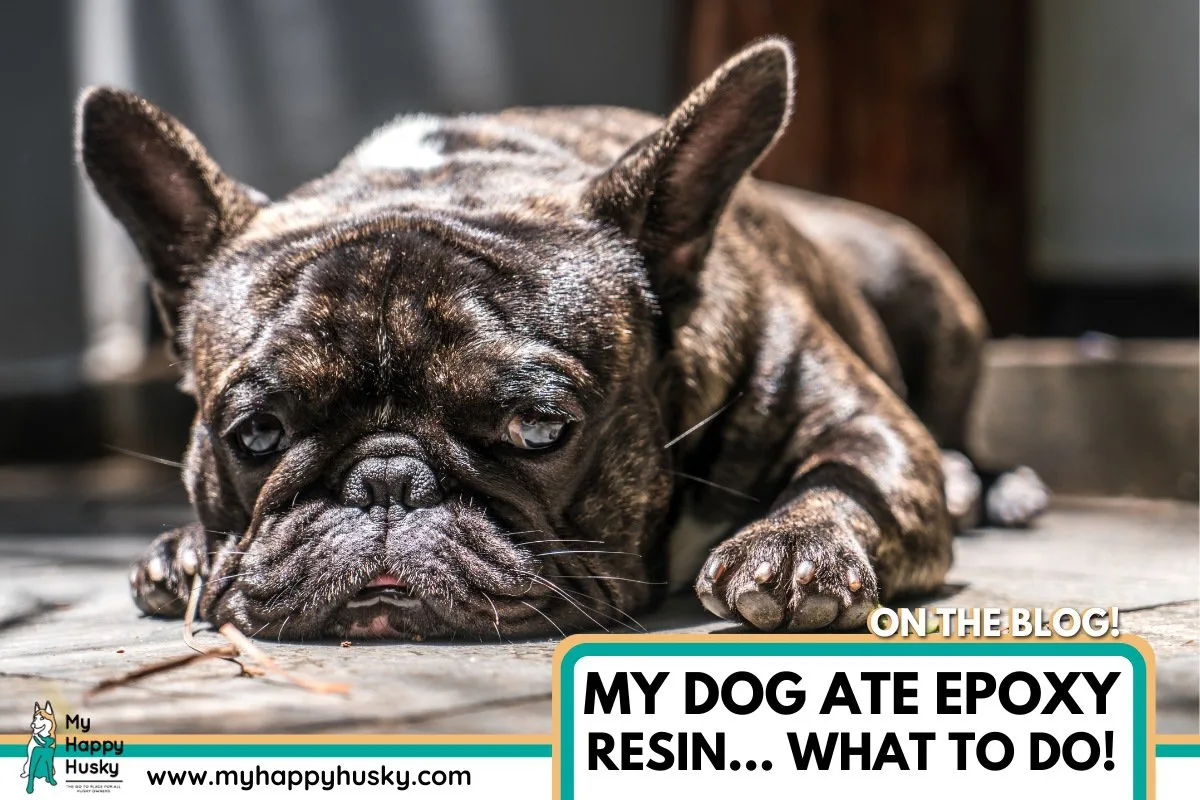Hey, fellow dog parents! So you’re dealing with a little epoxy resin incident…
First thing’s first: Don’t panic. But let’s not dilly-dally either. Here’s a quick and informative guide on what to do if your furball decides that epoxy resin looks like a tasty snack.

Why Is Epoxy Resin Bad News?
Epoxy resin is not something you want in your dog’s belly. Period.
It’s a chemical used to bond things together, and while it’s handy for crafts and home repairs, it’s a big no-no for pups.
Vets and experts from Pet Poison Helpline confirm that epoxy resin can be toxic to dogs. It can cause upset stomach, drooling, vomiting, and even more serious health issues like seizures.
What Are the Symptoms?
If your dog has ingested epoxy resin, keep an eye out for these symptoms:
- Drooling
- Vomiting
- Diarrhea
- Loss of appetite
Time is of the essence, so spotting these signs early can make a huge difference.
Popular: My Dog Ate Epsom Salt: What To Do Next
Immediate Steps to Take
Alright, so you’ve confirmed your dog ate some epoxy resin. The first step: Call your vet. If your vet isn’t available, an emergency pet poison hotline can also help.
I recommend the ASPCA Animal Poison Control Center, which can be reached at (888) 426-4435.
Provide them with all the information you have, like the amount your dog ingested and when it happened. They’ll guide you on the immediate steps you need to take.
Treatment and Following Vet’s Advice
Once you’ve reached a professional, do exactly what they say. Most likely, they will advise you to bring your dog in for a check-up. Sometimes, induced vomiting may be recommended, but only if the vet says so.
Treatment will depend on how much epoxy resin your dog consumed and how quickly you sought help. Your dog may need fluids, medications, or even more intensive care.
Preventing Future Epoxy Resin Incidents
Here’s where we get proactive. Store your epoxy resin and other chemicals up high or in locked cabinets. Let’s not let history repeat itself.
Also, supervise your dog when you’re working on projects that involve potentially harmful substances. Keeping an eye on your pooch can prevent a lot of mishaps.
FAQs
We also receive these questions in relation to this topic, so lets go through them with concise answers.
- Is any amount of epoxy resin safe for my dog to ingest?
- How long after ingestion should I look out for symptoms?
- What should I bring when I take my dog to the vet?
- Can epoxy resin cause long-term damage?
Is Any Amount of Epoxy Resin Safe for My Dog?
No amount of epoxy resin is safe for your dog to eat. Even a tiny bit can be harmful, so it’s important to act fast and contact your vet.
How Long After Ingestion Should I Look Out for Symptoms?
Symptoms can appear fairly quickly, usually within 30 minutes to a few hours. However, this can vary. So keep a close eye on your pup.
What Should I Bring When I Take My Dog to the Vet?
If you can, bring the epoxy resin container with you. This will help the vet understand what exactly was ingested and how to best treat it. Also, bring any medical records you have for your dog.
Can Epoxy Resin Cause Long-Term Damage?
Long-term effects largely depend on how quickly you get treatment for your pet. Immediate medical attention minimizes the risk, but it’s best to consult with your vet for a complete understanding of any potential long-term health issues.
Final Thoughts
I know it’s scary when our pets get into stuff they shouldn’t. But now you’re equipped with the info you need if this ever happens to you.
Remember, always consult a vet for medical advice when it comes to your furry friend.
Keep your dog safe and sound, and don’t forget to give them a good belly rub for me!
Disclaimer
The advice given in this article is for educational purposes only and does not constitute professional advice in any context. Before making any decisions that may affect the health and/or safety of your dog, you should always consult a trained veterinarian in your local area. For the FULL disclaimer Visit HereCopyright Notice: The content produced and published on My Happy Husky is unique and original. My Happy Husky makes an active effort to search for plagiarized content using plagiarism detection software. If plagiarized content is found, action will be taken.
